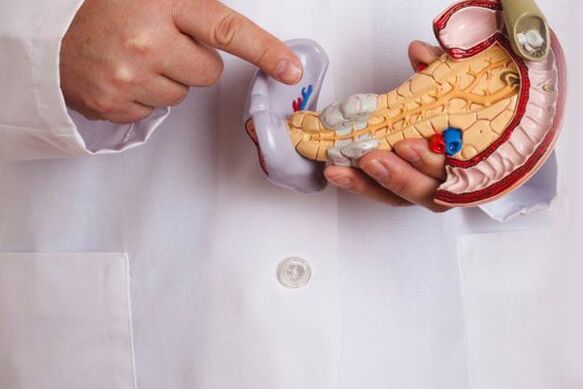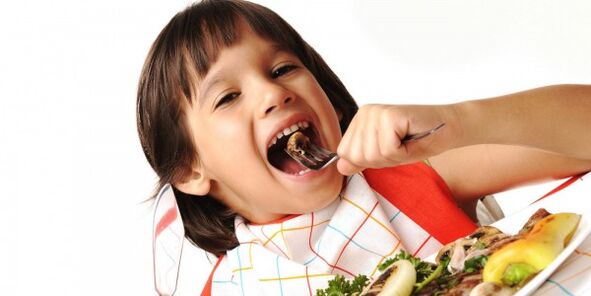Diet for pancreatitis is a key factor in successful treatment, so adherence to dietary restrictions will allow you to live a full life and reduce the risk of recurrence.
Pancreatitis is an inflammation of the tissues of the pancreas, which is accompanied by impaired secretion of digestive enzymes, severe pain, changes in stool and vomiting. This leads to pathological metabolic disorders and can lead to the development of diabetes. The main factors in the development of pancreatitis are overeating, abuse of fatty foods and alcohol.
For pancreatitis it is necessary to follow a diet for a long time. Acute inflammation requires dietary restriction for 6-9 months, while in chronic pancreatitis the diet is maintained for several years or a lifetime.
Strength features

Dietary regimens for pancreatitis depend on whether the inflammation is acute or chronic. Doctors note the positive effect of diet on pancreatitis. This allows you to quickly overcome acute inflammation in the chronic process, avoid complications and prolong the remission period.
Features of the diet:
- Within 2–3 days after the onset of acute pancreatitis should completely abstain from food. Thus, the rest of the pancreas is provided. Therapeutic fasting includes the use of non-carbonated alkaline mineral water, poorly brewed tea or rose infusion, one glass 5-6 times a day.
- On the fourth day after the start of therapeutic fasting, the gradual introduction of solid foods into the diet begins. As a rule, these are low-calorie unsalted foods that gradually increase the secretion of gastric juice.
- In pancreatitis, the method of cooking is important. Steaming is recommended, as food prepared in this way retains all the necessary substances and does not harm the digestive system.
- Food should not be chilled or hot, the optimum temperature is close to body temperature. In this case, the food should be crushed or semi-liquid.
- Diet for pancreatitis limits the use of even dietary foods. They eat at least five meals a day.
The diet includes foods:

- fatty;
- fried;
- hot sauces and spices;
- sour juices;
- canned, pickled cucumbers;
- smoked meats;
- confectionery;
- cocoa, chocolate;
- alcohol.
The energy value of such food should be at the level of 2500 kcal.
The disadvantage of this diet is an acute shortage of raw plant products. Some components need to be compensated by taking complex vitamins and dietary supplements.
Diet for acute pancreatitis
Diet is an integral part of therapy in the treatment of pancreatitis. During an acute exacerbation is accompanied by severe pain in the stomach and lack of appetite, so the first few days of medical fasting do not cause the patient to suffer.
Further dietary low-calorie foods are gradually introduced into the diet. It can be dried baked bread, fruit drinks and jellies, oatmeal and rice sticky decoctions, non-fat liquid mashed potatoes. In this case, it is recommended to remove the products that contribute to the formation of gas.
On days 6-7, protein foods are gradually introduced: steamed meat, mashed potatoes or vegetable puddings, steamed protein omelet.
It should be noted that the diet requires long-term adherence to dietary restrictions. For 6-9 months, you need to strictly follow its rules and monitor your diet daily.
The course of the disease may have certain characteristics, so the gastroenterologist and nutritionist are engaged in prescribing the diet. Specialists in this profile will determine what to eat in the diet of pancreatitis for each patient, taking into account the additional diseases.
After the acute phase of the disease, you can significantly diversify your menu with simple and healthy foods. It should be noted that the volume of fluid is about 1. 5 liters per day, and the number of meals should be at least a quarter.
Sample menu:
- Breakfast: boiled manna (rice) porridge; an Apple; Poorly brewed green tea with a spoonful of honey.
- Second breakfast: steamed chicken breast cutlets; carrot puree; Decoction of rose hips.
- lunch: vegetable soup with beef or fish; mashed potatoes; white bread crutches; Baked apples without peel.
- Lunch: low-fat cottage cheese; green tea with a spoonful of honey.
- Dinner>: steamed protein omelet from three chicken eggs; mashed potatoes from dietary vegetables; white bread crutches.
- Before going to bed: boiled milk.
Diet and symptoms of pancreatitis are significantly relieved and treated. This diet preserves the pancreas and gradually normalizes its function. The patient's well-being depends on how well he follows the diet. Various disorders in the diet immediately reflect the digestive function.
Diet for chronic pancreatitis
Chronic pancreatitis usually develops against the background of an acute condition, but it can also occur as a major disease in cases of complications of other diseases.
Diet and treatment of pancreatitis are two inseparable concepts. Even during remission, dietary rules should be followed.
Dietary rules for chronic pancreatitis:
- During this period, the caloric content of food should be commensurate with daily physical activity.
- Much attention is paid to the protein content of food. Turkey, chicken, rabbit, beef, lean pork and fish are allowed.
- Lamb, fatty pork, goose, duck and game dishes are not allowed in the diet.
- It is not possible to heat, fry, bake or bake food. The food should be cooked in a double pot or boiled.
- Cheese, previously banned in its advanced stages, is now allowed in small quantities, but it is advisable to replace milk with sour milk products.
- The diet should include grains and plant proteins indicated in yesterday’s bread, but it should be borne in mind that beans should be completely avoided during the diet with pancreatitis.
- The total amount of carbohydrates should not exceed 350 g per day. They are found in pasta, cereals, honey, canned food and syrups.
Approximate diet menu for chronic pancreatitis:
- breakfast: boiled rabbit; rice porridge.
- Late breakfast: low-fat cottage cheese; baked apples without honey.
- lunch: buckwheat soup; boiled or steamed fish with vegetables; compote of dried fruits.
- Lunch: cutlets cooked in vegetable sauce.
- Dinner: veal, unsweetened pudding; weak tea.
- Before going to bed: kefir.
Food in fractions and small portions. Food should be warmed at intervals of about three hours.
Salt and spices increase the secretion of enzymes in the digestive tract, so their number should be kept to a minimum. In addition, sour, smoked foods, baked goods and sour cream, as well as chocolate have a similar effect. Sugary foods can cause problems such as diabetes, so their content in the diet is reduced by 90%.














































































